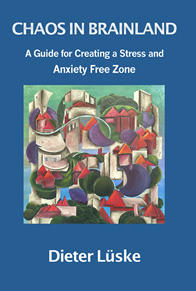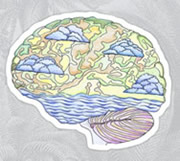useNature.com ... Holistic Health - Emotional Choice Counselling
Emotional Choice Counselling
Regret - Guilt - Anxiety
Lifestyle Online Magazine - Holistic Health Information
Article: The "Functional" Meaning of your Emotional Message

Article extracted from a workshop & book called:
DO YOU BELIEVE IN YOU - by Dieter Luske© - Gold Coast
... all following articles, are written as workshop manuscript
... questions were asked to stimulate active participation.
ARTICLE NUMBER - 19 - Chapter 3
The "Functional" Meaning of Emotions - (Emotional Message)
EMOTIONS AND THEIR FUNCTIONS
How to help emotions of Regret - Guilt - Anxiety
REGRET
Regret is one of the emotions which can linger on for ever, nagging your mind with negative feelings about yourself. Regret encompasses a mixture of emotions, depending what that regret was for. One fact about regret is that it is based on a time-factor.
It is an emotion of the past; you can't have regret for the future. Using the victim principle, ask yourself; "can you change a fact, in this case the past"?
No, therefore regret is a simple feedback message, pointing out to you that you could have done something different in a past situation. Notice, that I wrote, could not should.
Should would have brought on feelings of guilt in addition to regret..
Regret being a feeling of the past, also means you have done or not done something according to your knowledge and mindset of that time, and it is only hindsight that makes you think that another action may have been more appropriate.
Feelings of regret can be overcome by concentrating on the present or future.
THE POSITIVE FUNCTION of regret is to remind you that you may have made a mistake. Regret helps you not to make the same mistake again. If you listen to the message of regret and react positively, you will have made the mistake into a learning experience. Only through awareness can you avoid repeating a mistake in the future, and regret gives you that awareness. If you didn't study hard enough in the past and thus failed your examination, regret will help you study harder next time.
THE NEGATIVE FUNCTION of regret is in not doing anything about that emotion, thus making the same mistake over and over again and becoming a victim. Negative use of regret is most common, especially in fooling yourself. Any past decision has one common denominator-the past!
Nobody can tell you what would have happened, if you had decided otherwise. Actually nobody ever knows whether a decision made was the right one. Therefore, any decision you make will automatically be the right decision for you, as you either like it or learn from it.
Self doubt stops you from making a decision, which is funny if you think about it, as making no decision is just another form of decision making.This again may lead to the emotion of regret, for not having made a more constructive decision.
So you see, whatever you do, you never know whether it will turn out to be right or wrong, therefore proving again that there is no right or wrong, just right at that time. There are no guarantees in life, and you will never know 100% whether a decision will work out as intended. This teaches us, that it is O.K. to take a certain risk, as there is a risk in everything you do anyway. Remember, you learn more by living on the edge than by playing it safe.
GUILT
Guilt is a fantastic emotion and once you know the functional aspect of it you will love it too. Guilt can be used very effectively in having a good look at your values, standards and belief systems.
If you haven't worked those out yet, then this is your chance to do so.
Guilt simply means, you have violated one or more of your personal values, standards or belief systems.
This means that you didn't do what you should have done. Notice the word should here. Should, always implies GUILT. The first step towards not creating any more guilt, is to stop using the word should and use could instead.
Could implies that you have a choice.
THE POSITIVE FUNCTION of guilt is to keep a check on your actions. It rings an alarm bell, as soon as you do anything against your values etc. It helps you to determine, where your values, etc. are coming from. You may feel guilty for actions which have nothing to do with your own values. This would indicate that your guilt is triggered by your parent's, teacher's or anybody else's values.
Check your guilt feelings. Use the feedback of guilt to determine where those feelings are coming from. If you can't find the origin, you know that you carry somebody else's values around with you. This is the time to re-evaluate. Check whether those values, standards and belief systems still fit into your life today.
You are growing up, your understanding of life in new and different ways will have brought on many changes in your values, standards etc.
Now is the time to chuck out values that do not match any longer with what you know and understand as the person you are today.
It is common sense to have a different set of values at different points or ages in your life.
Without the feedback of guilt, there would be little to keep your behaviour in line with your values, standards and belief systems.
To summarise the positive function: guilt will help and teach you to evaluate your values, standards and belief systems and keep you in line with those you have selected for this moment.
THE NEGATIVE FUNCTION of guilt is feeling guilty over and over again about violating standards (which are either not yours anyway, or which have been superseded by more appropriate ones), without correcting either your actions or the values you have violated.
So, the next time you are late for an appointment, check your standards on punctuality. Are you feeling guilty for being late? If you are, then you have high standards of punctuality. The feeling of guilt will help you to stay in line with your high standards. Not listening to that guilt will make you a victim when you are repeatedly late, and you feel guilty each time.
ANXIETY
Anxiety and how to stop panic attacks in its complexity could be a book in itself.
Nevertheless the understanding of its function can help you to cope with minor anxieties, and help you to understand and learn to overcome the big ones. The one very basic approach to an anxiety is learning to be better prepared in the future.
Feelings of anxiety, tell you of an uncertainty you have in yourself. This uncertainty could stem from insufficient knowledge, fear, danger, doubt, negative visual mind images about yourself, anything, where you are for some reason not sure. What we discussed with regard to regrets, shows us that it is O.K. to take a certain risk. Being afraid of that risk, being afraid of coming out of the box can cause an underlying anxiety.
NOTE: That anxiety has to be classed as either real or imagined.
THE POSITIVE FUNCTION of an anxiety is the awareness that you have to prepare better. The awareness of whether it is real or imagined helps you to have a good look at yourself and to clear yourself of negative attitudes and uncertainties. It helps you to direct where to find the information you need in order to feel comfortable in yourself.
THE NEGATIVE FUNCTION is to react over and over again to the same situation with anxiety without changing anything or without preparing yourself better.
One way to prepare better is to seek counselling.
Talking about counselling, please know that counselling does not mean that there is something wrong with you. It is simply a chance to have someone look at your life from an outside perspective. You are too close to yourself, and you cannot have an unbiased view of your own life.
However, you could counsel yourself by using the technique of 'floating' out of your body, looking at yourself and your life from a third person's perspective.
You become a victim of your anxiety if you are not participating in life anymore, you have been 'kidnapped' by your emotion. The fear of the next anxiety attack is paralysing you. Emerge out of your emergency, seek help.
Another feature of anxiety, like regret, it contains a time factor.
Anxiety or its milder form, apprehension is directed towards the future.
It is as if you are in the future. Read the next paragraph twice:
In order to feel anxious, you have to be O.K. at this very second, (in the present). Otherwise you could not feel an anxiety, you would feel something else. If you were not all right in the present, you probably wouldn't even have the time to feel anxious.
Once trapped in anxiety, you can attempt to change it by bringing your consciousness, your full awareness into the present. You then attend to the facts around you and stop concentrating on those negative anxious movies inside your head.
Ask yourself questions such as:
"what is really at stake here? My life? My health? My relationship? My money? My credibility? Rejection? A few hours of unpleasantness? Anything of real importance?
If you can concentrate totally on your present awareness, thinking:
"I am standing here, I am breathing, and I can hear voices and music, etc., then you actually can't feel a future feeling like anxiety.
Anxiety is something you fear in the future, and it is not happening now.
... to be continued with: Fear - Joy - Fun
Article provided by the Editor - Dieter L.
Excerpt from a workshop & book - published 1993 - titled; "Do you believe in You"
www.usenature.com - Dieter Luske ©
Next: Article 20 - click > Fear - Joy - Fun
or go back to the Article Menu > Self Help Article Menu
Dieter Luske - Author
Certified Human
Sci-Fi Crime Novel
Society has been quietly infiltrated by machines that mimic human appearance.
Overcome
Chaos in Brainland
Dieter Luske on FBBy the Editor of useNature:
Buy Now
It happened in the seventies
An intriguing story of personal risk-taking, self-discovery and profound change.





